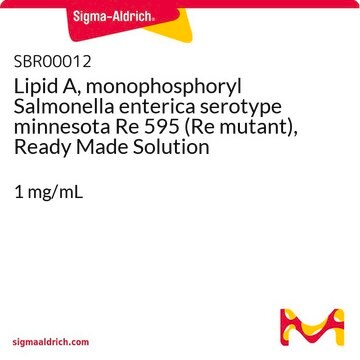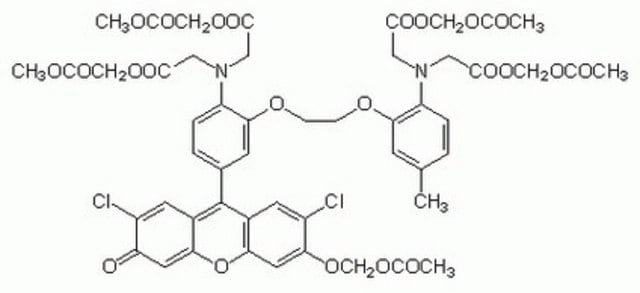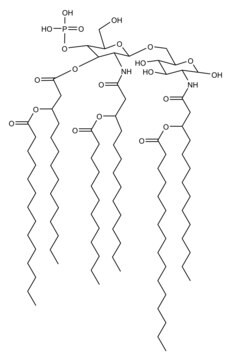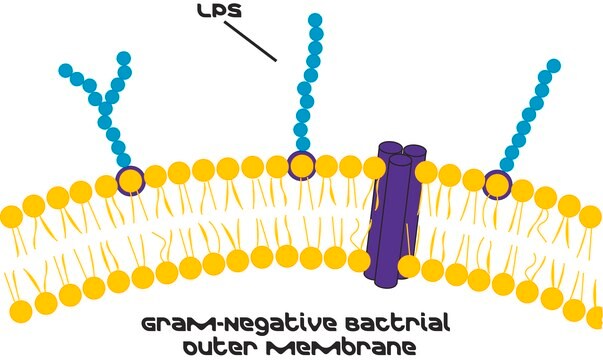SCP0052
[Glu11]-Amyloid β 1-16
Se connecterpour consulter vos tarifs contractuels et ceux de votre entreprise/organisme
About This Item
Formule empirique (notation de Hill) :
C84H119N27O28
Poids moléculaire :
1955.01
Code UNSPSC :
12352209
Nomenclature NACRES :
NA.32
Produits recommandés
Essai
≥95% (HPLC)
Forme
lyophilized
Composition
Peptide Content, ≥70%
Conditions de stockage
protect from light
Température de stockage
−20°C
Amino Acid Sequence
Asp-Ala-Glu-Phe-Arg-His-Asp-Ser-Gly-Tyr-Glu-Val-His-His-Gln-Lys
Application
Amyloid β (Aβ) refers to peptides derived from Amyloid precursor protein that vary in length from 36-43 amino acids. Aβ(s) peptides, their peptide fragments and mutated fragments are used to study a wide range of metabolic and regulatory functions including activation of kinases, regulation of cholesterol transport, function as a transcription factor, and regulators of inflammation. Aβ(s) peptides and their peptide fragments are also used to study oxidative stress, metal binding and mechanisms of protein cross-linking in the context of diseases such as Alzheimer′s disease and neurodegeneration.
Code de la classe de stockage
11 - Combustible Solids
Classe de danger pour l'eau (WGK)
WGK 3
Point d'éclair (°F)
Not applicable
Point d'éclair (°C)
Not applicable
Faites votre choix parmi les versions les plus récentes :
Certificats d'analyse (COA)
Lot/Batch Number
Vous ne trouvez pas la bonne version ?
Si vous avez besoin d'une version particulière, vous pouvez rechercher un certificat spécifique par le numéro de lot.
Déjà en possession de ce produit ?
Retrouvez la documentation relative aux produits que vous avez récemment achetés dans la Bibliothèque de documents.
Youssef El Khoury et al.
The journal of physical chemistry. B, 115(49), 14812-14821 (2011-10-27)
Alzheimer's disease is a neurodegenerative disorder in which the formation of amyloid-β (Aβ) aggregates plays a causative role. There is ample evidence that Cu(II) can bind to Aβ and modulate its aggregation. Moreover, Cu(II) bound to Aβ might be involved
Craig S Atwood et al.
Brain research. Brain research reviews, 43(1), 1-16 (2003-09-23)
Although much maligned, the amyloid-beta (Abeta) protein has been shown to possess a number of trophic properties that emanate from the protein's ability to bind Cu, Fe and Zn. Abeta belongs to a group of proteins that capture redox metal
Antonio Verdoliva et al.
Human vaccines, 6(11), 936-947 (2010-10-29)
Over the past few years, new ways of fighting Alzheimer's disease have emerged based on stimulating the immunitary defence system of the patients. To avoid toxicity and autoimmune response related to the Aβ[1-42] peptide immunotherapy, in the last decade a
Notre équipe de scientifiques dispose d'une expérience dans tous les secteurs de la recherche, notamment en sciences de la vie, science des matériaux, synthèse chimique, chromatographie, analyse et dans de nombreux autres domaines..
Contacter notre Service technique








